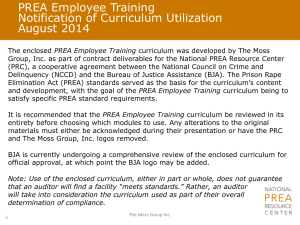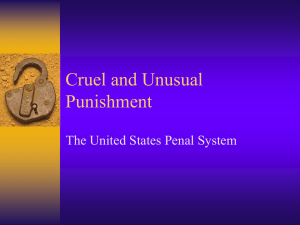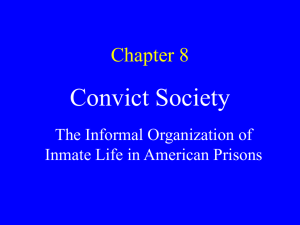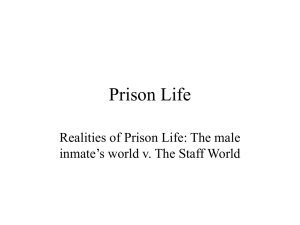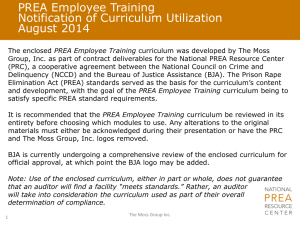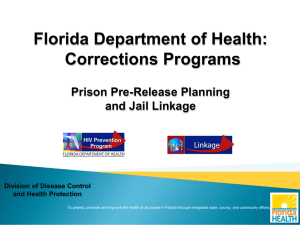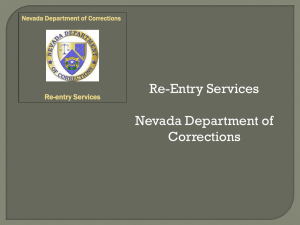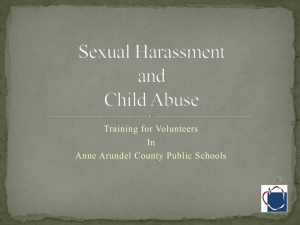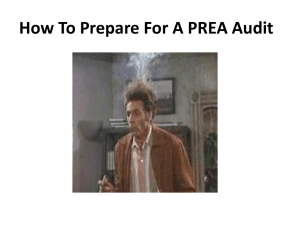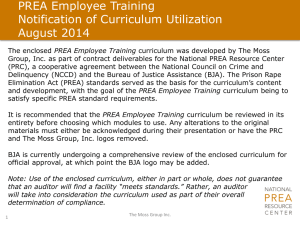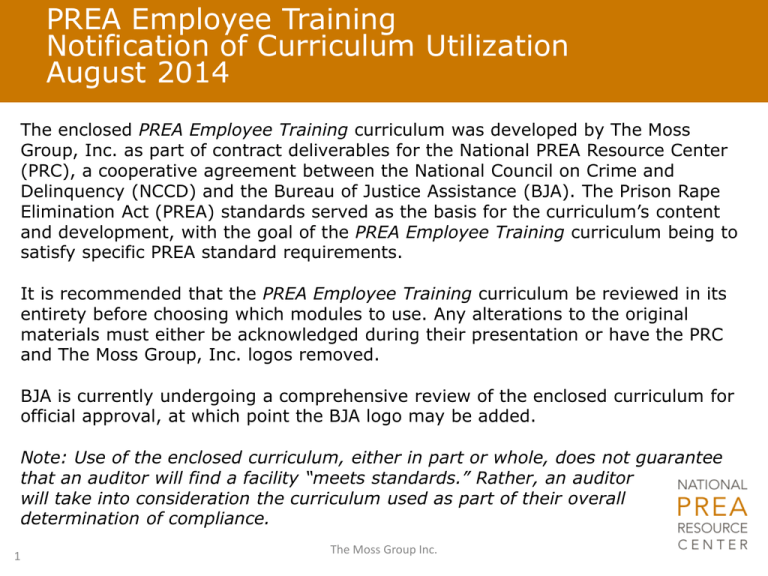
PREA Employee Training
Notification of Curriculum Utilization
August 2014
The enclosed PREA Employee Training curriculum was developed by The Moss
Group, Inc. as part of contract deliverables for the National PREA Resource Center
(PRC), a cooperative agreement between the National Council on Crime and
Delinquency (NCCD) and the Bureau of Justice Assistance (BJA). The Prison Rape
Elimination Act (PREA) standards served as the basis for the curriculum’s content
and development, with the goal of the PREA Employee Training curriculum being to
satisfy specific PREA standard requirements.
It is recommended that the PREA Employee Training curriculum be reviewed in its
entirety before choosing which modules to use. Any alterations to the original
materials must either be acknowledged during their presentation or have the PRC
and The Moss Group, Inc. logos removed.
BJA is currently undergoing a comprehensive review of the enclosed curriculum for
official approval, at which point the BJA logo may be added.
Note: Use of the enclosed curriculum, either in part or whole, does not guarantee
that an auditor will find a facility “meets standards.” Rather, an auditor
will take into consideration the curriculum used as part of their overall
determination of compliance.
1
The Moss Group Inc.
Unit 4: Professional Boundaries
Notice of Federal Funding and Federal Disclaimer – This project was supported by Grant No. 2010-RP-BX-K001 awarded by the Bureau of Justice Assistance. The Bureau
of Justice Assistance is a component of the Office of Justice Programs, which also includes the Bureau of Justice Statistics, the National Institute of Justice, the Office of
Juvenile Justice and Delinquency Prevention, the Office for Victims of Crime, and the Office of Sex Offender Sentencing, Monitoring, Apprehending, Registering, and
Tracking. Points of view or opinions in this document are those of the author and do not necessarily represent the official position or policies of the U.S. Department of
Justice nor those of the National Council on Crime and Delinquency (NCCD), which administers the National PREA Resource Center through a cooperative agreement with
the Bureau of Justice Assistance.
Introductions
Faculty
•
•
3
Participants
Name, Title
Experience with PREA and/or
training
•
Name and Position
The Moss Group, Inc.
Employee Training Series Outline
This training is part of series of trainings to assist agencies with
PREA Standards 115.31, 115.131, 115.231, and 115.331
Unit 1:
The Prison Rape Elimination Act: Overview of the Law
and Your Role
Unit 2:
Inmates’ Rights to be Free from Sexual Abuse and
Sexual Harassment and Staff and Inmate Rights to be
Free from Retaliation for Reporting
Unit 3 Part I:
Prevention and Detection
Unit 3 Part II:
Response and Reporting
Unit 4:
Professional Boundaries and False Allegations
Unit 5:
Effective and Professional Communication with
Inmates
4
The Moss Group, Inc.
Objectives for Unit 4
1. Recognize inappropriate behavior, contact or relationships
between staff and inmates
2. Understand the safety vulnerabilities and implications for
facility culture when staff breach professional boundaries with
inmates
3. Develop strategies to avoid inappropriate relationships with
inmates
4. Develop strategies to avoid and address false allegations
5
The Moss Group, Inc.
Objective 1: Recognize inappropriate behavior,
contact or relationships between staff and inmates
To meet this objective we will discuss
• Reasons why relationships may occur in confinement
settings between staff and inmates
• Identify inappropriate behaviors
6
The Moss Group Inc.
Let’s Discuss
• We all know relationships with inmates are inappropriate,
against the rules, and can create safety issues
• So why do you think it happens?
• It is a complicated issue!
7
The Moss Group, Inc.
Understanding the Mix of Dynamics in
Confinement Settings
• Confinement settings are complex:
− Same community
− Know inmates long-term at the facility
− Staff may have their own vulnerabilities
− Closeness in age between staff and inmates
• This can create challenges in maintaining professional
boundaries
• Remember, in confinement there is no such thing as staffinmate consensual relationships
8
The Moss Group Inc.
Group Discussion
Discuss in small groups:
• What behaviors have you seen in facilities that blurred
or crossed professional boundaries?
• What are some behaviors that could be considered in
the “gray area”?
• What might be challenging in maintaining professional
boundaries?
9
The Moss Group Inc.
Examples of Inappropriate Behaviors
• Some behaviors that can put you at risk of crossing professional
boundaries include:
− Making sexual jokes with inmates or in front of inmates
− Using inmate nicknames instead of proper terminology dictated
by policy
− Discussing personal issues with inmates or in front of inmates
− Allowing a favorite inmate to have special privileges
− Feeling like you can trust an inmate to have your back
− Doing special favors for inmates (contacting outside family
members or bringing in contraband)
− Getting involved with inmate issues
− Gossiping about other staff with inmates or in front of inmates
− Complaining about supervisors or your job with inmates
• Can you think of any others?
10
The Moss Group Inc.
Messages to Staff: What is expected?
Avoid
sexualized
environment
Be
Compassionate
Be respectful
Report
suspicious
behavior
Be Trauma
Informed
No Personal
Dealings
Beware of
Games
“cons” play
PREA and Boundaries
What Can You Do?
• Observe and learn the patterns and behaviors of the
inmates you supervise to better prevent, detect and
respond to sexual abuse
• Be approachable and respectful by using professional
communication
• Remember your role with inmates and refer them to
appropriate staff
• Follow your agency policy
12
The Moss Group Inc.
Objective 2: Understand the safety vulnerabilities and
implications for facility culture when staff breach professional
boundaries with inmates
To meet this objective we will discuss:
• How staff-inmate relationships:
• Impact professionalism and agency credibility
• Impact staff and inmate safety
• Impact facility culture and community
13
The Moss Group Inc.
Professionalism Compromised
Inappropriate staff-inmate relationships…
• Jeopardize security
• Victimize/re-traumatize those vulnerable from past
abuse situations
• Damage trust among staff, inmates, families,
volunteers and contractors
• Violate constitutionally-guaranteed rights of inmates
• Create a hostile/sexualized work environment
• Expose entire agency and staff to civil and criminal
liability
• Polarize the department as people take sides
• Create bad media/press
• Undermine public support for corrections and for
government
14
The Moss Group Inc.
Safety Compromised
Inappropriate staff-inmate relationships…
• Result in contraband being brought into the facility
• Create an opportunity for inmates to access restricted
areas
• Can provide inmates with access to information on
security and operations at the facility
• Put the staff in a precarious situation, beholden to
inmate requests for fear of being found out
• Create distrust with co-workers, who will have your
back?
• Staff stop thinking clearly about safety and security,
focused on the relationship
15
The Moss Group Inc.
Culture Compromised
Inappropriate staff-inmate relationships…
• Create a sexualized work environment
• Create a culture of secrecy and code of silence
• Create a culture of accepting inappropriate behaviors,
makes staff uncomfortable to go to work
• Can result in unwanted media attention, lawsuits,
investigations
• Damage lives (staff, victims and families impacted)
16
The Moss Group Inc.
Objective 3:Develop strategies to avoid
inappropriate relationships with inmates
To meet this objective we will discuss:
• Questions to ask yourself to maintain boundaries
• How to help your co-workers if they are close to crossing
professional boundaries
• Policy to guide actions and behaviors
17
The Moss Group Inc.
Answer these Questions:
Do you look forward to seeing a particular inmate when you come to work?
Yes or No?
2
Have you done anything with an inmate you would not want your family or your supervisor to
know about?
Yes or No?
3
Would you be reluctant to have a co-worker observe your behavior for a whole day?
Yes or No?
4
Do you talk about your personal matters with inmates?
Yes or No?
5
Do you believe you can ask an inmate to do personal favors for you?
Yes or No?
6
Have you ever received personal advice from an inmate?
Yes or No?
7
Have you said anything to an inmate that you would not want tape recorded?
Yes or No?
8
Do you have thoughts or fantasies of touching a particular inmate? Does this extend into planning
how you can be alone with the inmate?
Yes or No?
9
Do you think you have the right to touch an inmate wherever and whenever you want to?
Yes or No?
10
Do you have a feeling of not being able to wait to share good/bad news with a particular inmate?
Yes or No?
11
Do you think inmates are not allowed to say no to you, no matter what you ask?
Yes or No?
12
Have you ever allowed inmates to talk about sexual experiences or sexual fantasies, or to tell
sexual jokes in your presence?
Yes or No?
Source: “The Dangerous Dozen” by Teena Farmon
18
1
What if you Answered “Yes”?
• It is important to address your concerns if you answered “yes”
to any of the previous questions
• Utilize employee assistance, if applicable
• Seek guidance from a supervisor
• Seek support professionally or from a trusted source
19
The Moss Group Inc.
What about your Co-Worker?
• What if you notice a co-worker who is demonstrating some of
the signs we discussed?
• Depending on the severity of behaviors, you can talk with your
co-worker and make sure they are ok, tell him/her what you
have noticed about their behavior and try to help them
• If you suspect sexual abuse you must report it
20
The Moss Group Inc.
Remember: Follow Your Agency Policy
21
•
Policy should guide ethics, values and behavior
•
Guidelines from policy might include:
−
Do not share personal information
−
Do not socialize within or outside the workplace
−
Do not give legal advice
−
Do not grant special favors
−
Do not give or accept gifts
−
Do not gamble or make bets
−
What’s in your policy?
The Moss Group, Inc.
Develop Strategies
Individual Exercise
• Write on a piece of paper strategies you can use to
avoid inappropriate relationships
• Examples may include:
• Follow policy
• Avoid being alone with inmates, consistent with
agency policy
• Think about how I communicate and what I
say, am I being professional?
• Develop personal values and guidelines to
follow everyday
• Identify someone to talk to if you feel you are
vulnerable
22
The Moss Group, Inc.
Small Group Discussion
In your groups:
• Review the assigned scenario(s) and reach a group
consensus of how the staff person in question should
handle the situation
• Hold your answer until asked to share with the larger
group
23
The Moss Group, Inc.
Objective 4: Develop strategies to avoid and
address false allegations
To meet this objective we will discuss:
• Ways staff can avoid false allegations through policy and
practice
• Challenges of false allegations and ways to respond
24
The Moss Group Inc.
Strategies to Avoid False Allegations
• For anyone working in corrections, you may face a false
allegation against you
• What can you do?
− Maintain respectful and professional communication at all
times
− Clearly establish your professional boundaries with staff
and inmates
− Create credibility among inmates and staff through being
fair and policy-minded
− Other suggestions?
25
The Moss Group Inc.
False Allegations Can Occur
• False allegations can be personally and professionally
challenging
• Investigations are critical even in false allegations, it maintains
credibility of the system and can clear your name
• Do not spread rumors or gossip about the person in question
• Educate inmates on the damage false allegations can create on
personal lives, the facility, and their own lives should something
serious need to be reported
• When sexual abuse is addressed in policy and practice, there
may be an initial spike in both legitimate and false allegations
26
The Moss Group Inc.
Disciplinary Sanction for Inmates, 115.78
• For the purpose of disciplinary action, a report of sexual abuse
made in good faith based upon a reasonable belief that the
alleged conduct occurred shall not constitute falsely reporting
an incident or lying, even if an investigation does not establish
evidence sufficient to substantiate the allegation
• What does your policy state regarding disciplinary sanctions for
inmates who make false allegations?
• The challenge is maintaining a reporting culture by not
punishing those who are making reports in good faith
27
The Moss Group Inc.
Group Discussion
In Small Groups, discuss:
• Why do you think false allegations might occur?
• How can you as staff respond?
28
Individual Exercise
What is Your Commitment?
• Create a list of five practical things you can do at work
tomorrow (or the next day you return) as a result of
this training
• Share three of them with your group
29
The Moss Group, Inc.
Review Objectives for Unit 4
1. Recognize inappropriate behavior, contact or relationships
between staff and inmates
2. Understand the safety vulnerabilities and facility culture
implications when staff breach professional boundaries with
inmates
3. Develop strategies to avoid inappropriate relationships with
inmates
4. Develop strategies to avoid and address false allegations
30
The Moss Group, Inc.
End of Unit 4
31
The Moss Group Inc.

